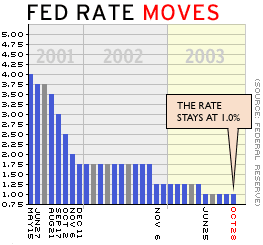NEW YORK (CNN/Money) -
Federal Reserve Chairman Alan Greenspan expressed cautious optimism Thursday about the short-term prospects for the U.S. economy, but said the Fed could "be more patient" than usual about raising rates and warned of the perils of high budget deficits.
Greenspan, in prepared remarks delivered to the Securities Industry Association annual meeting in Boca Raton, Fla., said "the odds ... increasingly favor a revival in job creation," which wouldn't come a moment too soon for the health of the broader economy.

"Unless hiring picks up and layoffs ease, assuaging the latent job security fears of many of those currently employed, the share of income spent could decline, a development that would hamper the vigor of the expansion," the central bank chairman said.
Greenspan said the economy was able to grow in the third quarter at the fastest pace in nearly 20 years, while still shedding jobs because of "astonishing" gains in productivity, or output per worker hour, which grew at about a 7.5-percent annual rate in the second and third quarters.
But productivity can't keep growing at such rates forever, and businesses may feel the need to rebuild their inventories, which were sapped during the summer's run of strong sales. If they do, and if demand stays strong, then hiring should pick up, Greenspan said.
Though interest rates typically rise during such periods, Greenspan hinted the Fed could stay on the sidelines for longer than some market participants might expect. Usually the Fed is quick to raise rates when the economy starts to take off, in an effort to keep a lid on inflation.
But inflation is extremely low right now, with core consumer price indices growing at a rate of little more than 1 percent per year lately.
"In these circumstances, monetary policy is able to be more patient," Greenspan said.
At its most recent policy meeting, in late October, the Fed left its key short-term rate at the lowest level in more than 41 years and promised to keep rates low for a "considerable period."
Fed Governor Ben Bernanke, in a separate speech at Carnegie Mellon University in Pittsburgh, echoed Greenspan by saying the Fed had "considerable scope for a continuation of the currently accommodative monetary policy without undue risk to price stability."
U.S. stock and bond markets, always keenly interested in the future course of interest rates, apparently heard little in these speeches that changed their views. Stock prices were mixed, while bond prices fell in afternoon trading.
The central bank chairman described in some detail his fears about what he saw as a dangerous deterioration in the federal budget. After posting a budget surplus in 2001, the deficit is likely to approach a record high of nearly $400 billion in 2003.
Though some of the recent deterioration was probably unavoidable, due to the 2001 recession and the need for increased spending on defense and homeland security after the Sept. 11, 2001, terrorist attacks, Greenspan said he saw little sign that the Bush administration and lawmakers were serious about getting their fiscal house in order.
"Recent budget deliberations are not encouraging," he said. "The current debate appears to be about how much to cut taxes or how much to increase spending. No significant constituency seems to support taking the actions that will be necessary to move toward, and one hopes achieve, budget balance."
Greenspan warned that, as Baby Boomers begin to retire and draw down Social Security and Medicare payments within the next decade, the budget picture will get considerably worse, if current tax and spending policies are maintained.
"Such a development could have notable, destabilizing effects on the economy," he said.

|

